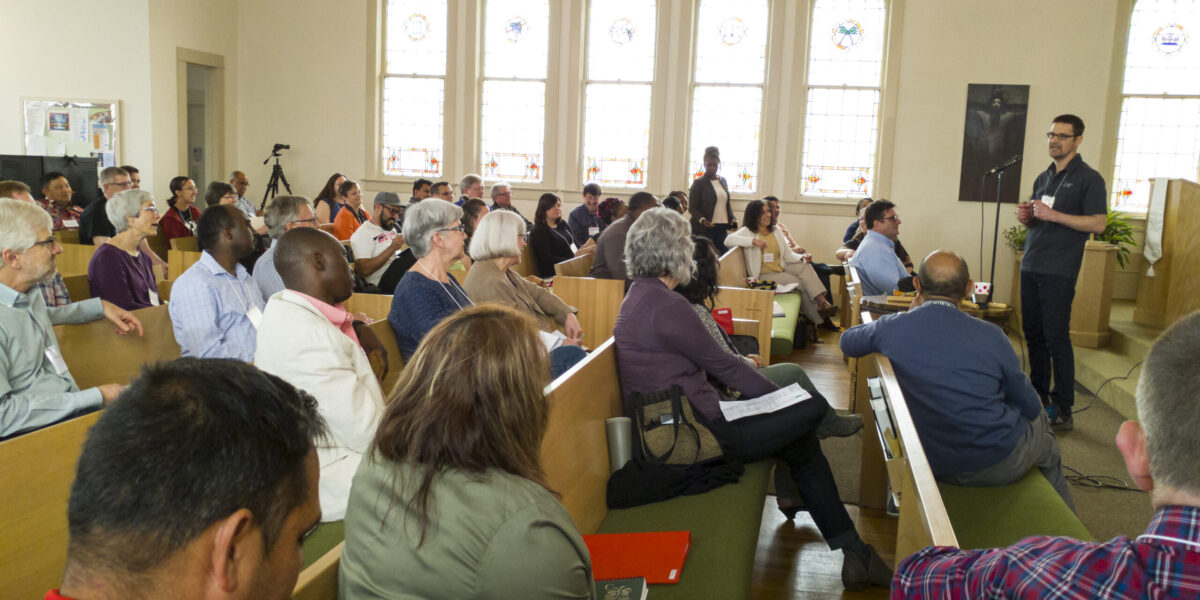"As the Father has sent me, so I send you." These words, from the resurrected Jesus to his disciples, have become the namesake of Sent, Mennonite Mission Network’s church planting and revitalization initiative. They also appear at the center of John 20:19-23, the theme text for Mennonite Church USA’s bi-annual convention in 2019. On a personal note, I return to these words often in my quest to define the complex, and often controversial, word "mission." Even more, I find that these words may help us to renew our understanding of Christianity itself as an essentially missional and multi-dimensional faith.
First, Christianity is a missionary, or if one prefers, a missional faith. Mission comes from missio, a Latin word meaning simply, "sending." Consequently, when Jesus refers to himself as "sent" from the Father, and to disciples as sent from him, he is speaking of mission as God’s basic way of relating to the world. God is not aloof but active in creation and sends the church beyond the four walls and locked doors of the house where its members meet to proclaim the good news that God has come in Christ to liberate the world from the power of sin (20:19-23).
But, second, if we accept that God has created the church not for its own sake but for the world, we must say more about how we are sent. Following John 20:19-29, I will propose three dimensions of faith that characterize our mission as a response to God’s mission.
Our first response of faith to God’s grace in Jesus Christ is worship. In the text, worship erupts[JS1] as the joy of disciples as they experience the real presence of the resurrected Jesus. "The disciples rejoiced when they saw the Lord." This joy was the fruit of the Lord’s "peace," as he greeted them and as he showed them the wounds of his love outpoured for them on the cross (20:19-20). In the Mennonite tradition, it is customary to speak of discipleship as "the essence of Christianity," yet it may be less common for us to esteem worship, joy, and spontaneity as authentic signs of our "following after Jesus."[1] Yet the text affirms that discipleship begins with Christ’s call, and Christ’s call elicits our worship.
Our second response of faith is implied in Christ’s commission to disciples, to which we have already referred: "As the Father has sent me, so I send you." The sentence itself connects Jesus’ mission to our own, and the sentences that follow in the text give clarity to that connection. As Jesus was conceived and anointed by the Holy Spirit, so disciples of Jesus are born of and sent by the Spirit: "he breathed on them and said, ‘Receive the Holy Spirit.’" Jesus’ next statement connects sending in the power of the Spirit to the "forgiveness" and "retention" of sins: "if you forgive the sins of any, they are forgiven them; if[JS2] you retain the sins of any, they are retained" (20:21-23 NRSV). Though I do not have room here to discuss the precise meaning of the forgiveness and retention of sins, the disciples’ commission here means something like what the apostle Paul called "the ministry of reconciliation," in which God’s love for us in Christ "while we were yet sinners" or "God’s enemies" is the basis for our extending mercy to one another (2 Cor 5:18; Rom 5:8-10). Moreover, because Paul refers to this ministry as diakonia (Greek for "service" or "waiting on tables" [cf. Acts 6:1-7]), we may refer to this dimension of mission as "work." Even so, this work flows from the touch of God’s grace, the breath of the Spirit from the mouth of Jesus on the faces of disciples. The wind powers the work.
Like the first two responses of disciples in this text, a third dimension of faith—Thomas’ confession of Jesus’ identity—arises from the greeting of peace. Because Thomas was not with the other disciples when Jesus first appeared to them, Jesus returned to show himself to Thomas. Upon seeing the marks of crucifixion on Jesus’ resurrected body, Thomas’s lips are loosed in praise—"My Lord and my God!" (20:24-28). As the disciples "rejoiced when they saw the Lord," so this disciple gives a verbal and articulate testimony of Jesus upon beholding him. Thomas gives word to his experience of Christ. Authentic discipleship and mission involve the proclamation of the word.
These three—worship, work, and word—are of the essence of our missional faith, just as our missionary God is One-in-Three: Father, Son, and Holy Spirit. As a people of mission, our calling is to bear whole witness to this God— through worship, work, and word—for the world that God so loves (John 3:16).
[1] On discipleship or "following Jesus" as "the essence of Christianity", see Harold S. Bender, The Anabaptist Vision (Scottdale, PA: Herald Press, 1944).








